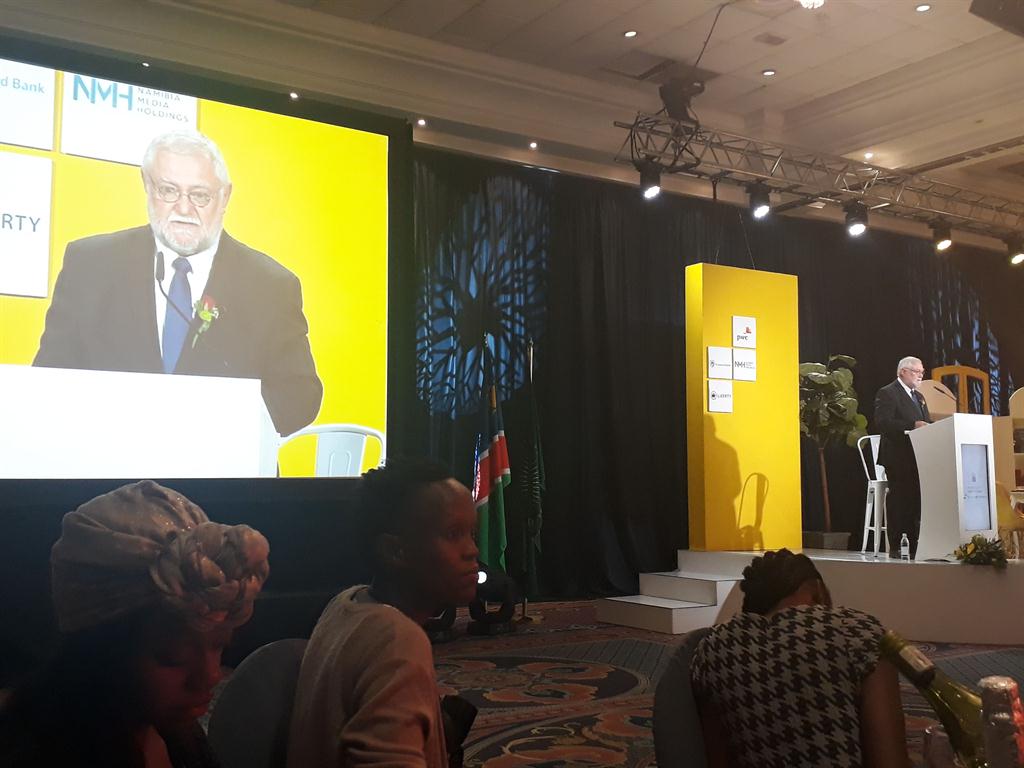Policies will trim wage bill’s burden - Schlettwein
Ronelle Rademeyer - The minister of finance, Calle Schlettwein, conceded that the public wage bill is not sustainable and said that is why policies have been put in place to, from a fiscal point of view, reduce that burden.
He was prompted about the public wage bill which increased with 110% between 2012-’13 and 2017-’18 at the annual budget review dinner, Budget on a Plate. He said that happened on the back of job re-grading and notch improvements which were above inflationary adjustments.
This event on Wednesday evening was presented by Namibia Media Holdings (NMH), PwC Namibia, Standard Bank Namibia and Liberty.
Schlettwein said government measures to contain the wage bill include incremental wage increases, natural attrition and not hiring new people.
This year’s budget allocation for personnel expenditure stands at N$29.969 billion.
Naufiku Hamunime, an economist at Standard Bank Namibia and one of the panelists, said apart from personnel expenditure being the largest single expenditure in the national budget, a decrease in SACU revenue is one of the other other challenges the government faces.
Revenue from the SACU pool as a percentage of the total revenue has been declining since 2012-’13. The projected revenue this year will be N$18.9 billion.
The other fiscal challenge is the increase of public debt above the threshold of 35% of GDP. It stood at N$87.5 billion, or 46.7% of GDP, by the end of the 2018-’19 financial year.
According to Chantell Husselmann, tax leader at PwC Namibia, said the debt stock will peak at N$52.3% of GDP in 2021-’22.
Schlettwein in this review emphasised that this year’s budget mainly focuses on increasing the development budget with 42% to N$7.9 billion in order to stimulate growth.
Project financing amounting to N$1.1 billion under the African Development Bank (AfDB) arrangement will be deployed, with own budget funding of N$831,9 million set aside for logistic infrastructure, mainly rail and road projects, agricultural mechanisation and school infrastructure renovation.
The remaining N$2.9 billion under the AfDB funding will be utilised over the next two years, he said.
“At least 25% of this funding for development projects must be kept in our economy,” the minister stressed.
He also said that the Public Procurement Board will improve its turn-around time.
According to Hamunime procurement should be used as an empowerment tool for local entrepreneurs. “Reforms in terms of ease of doing business is also necessary,” she said.
Husselmann’s statistices showed 25% of the expected total tax revenue of N$58 billion will come from income tax on individuals, whereas companies will only contribute 14% to the national revenue. “That shows we need to boost local business activity in our country and make companies more profitable,” she said.
He was prompted about the public wage bill which increased with 110% between 2012-’13 and 2017-’18 at the annual budget review dinner, Budget on a Plate. He said that happened on the back of job re-grading and notch improvements which were above inflationary adjustments.
This event on Wednesday evening was presented by Namibia Media Holdings (NMH), PwC Namibia, Standard Bank Namibia and Liberty.
Schlettwein said government measures to contain the wage bill include incremental wage increases, natural attrition and not hiring new people.
This year’s budget allocation for personnel expenditure stands at N$29.969 billion.
Naufiku Hamunime, an economist at Standard Bank Namibia and one of the panelists, said apart from personnel expenditure being the largest single expenditure in the national budget, a decrease in SACU revenue is one of the other other challenges the government faces.
Revenue from the SACU pool as a percentage of the total revenue has been declining since 2012-’13. The projected revenue this year will be N$18.9 billion.
The other fiscal challenge is the increase of public debt above the threshold of 35% of GDP. It stood at N$87.5 billion, or 46.7% of GDP, by the end of the 2018-’19 financial year.
According to Chantell Husselmann, tax leader at PwC Namibia, said the debt stock will peak at N$52.3% of GDP in 2021-’22.
Schlettwein in this review emphasised that this year’s budget mainly focuses on increasing the development budget with 42% to N$7.9 billion in order to stimulate growth.
Project financing amounting to N$1.1 billion under the African Development Bank (AfDB) arrangement will be deployed, with own budget funding of N$831,9 million set aside for logistic infrastructure, mainly rail and road projects, agricultural mechanisation and school infrastructure renovation.
The remaining N$2.9 billion under the AfDB funding will be utilised over the next two years, he said.
“At least 25% of this funding for development projects must be kept in our economy,” the minister stressed.
He also said that the Public Procurement Board will improve its turn-around time.
According to Hamunime procurement should be used as an empowerment tool for local entrepreneurs. “Reforms in terms of ease of doing business is also necessary,” she said.
Husselmann’s statistices showed 25% of the expected total tax revenue of N$58 billion will come from income tax on individuals, whereas companies will only contribute 14% to the national revenue. “That shows we need to boost local business activity in our country and make companies more profitable,” she said.





Comments
Namibian Sun
No comments have been left on this article